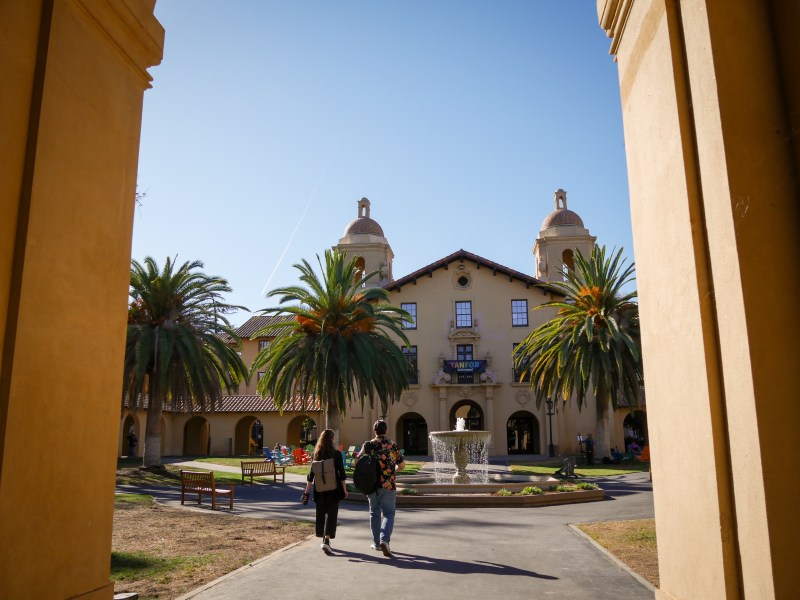A few days ago, Stanford students had the opportunity to elect their leadership in the Associated Students of Stanford University (ASSU). I am always excited to see when the candidates take their platforms to the students and advocate whether they are the best candidates for the job. This year, I was confronted with a concerning email from my representatives in the Graduate Student Council.
The election of President of the ASSU was contested, which I believe is a great demonstration of democratic health in a student movement. Three slates of candidates representing different approaches to (shared) concerns about our experiences here at Stanford were all contesting to get your support, my support. My warm congratulations to the winners of this election, incoming president Sophia Danielpour and vice president Kyle Haslett from ‘Fun Strikes Back.’
Like every year, we were invited to vote by the Elections Commissioner in the early hours of Friday. I was unpleasantly surprised by an email on Friday morning during the vote from the chairs of the Graduate Student Council (GSC, one of the two legislative bodies of ASSU) through the mailing list with all graduate students, which is populated by the University registrar. The GSC and ASSU Executive get exclusive access to this list from the University in order to perform their official duties. This email did not only encourage graduate students to vote but also included a campaign poster and a bold encouragement to vote for one presidential slate in particular: Christian Sanchez (outgoing ASSU vice president) and Gurmenjit Bahia.
Whether the candidates approved of this email campaign or not, I will assume that the intentions of the GSC were good. The GSC decided to endorse a candidate and used this institutional megaphone, which is one of what I’d call “institutional resources” (ASSU funds, swag, meeting spaces or in this case communication channels) to get out the vote. However, by also including explicit endorsements in this email campaign (“We believe that [Christian and Gurmenjit] represent the best choice for graduate students”), they created an unequal playing field between candidates.
This was brought up at the ASSU Slack channel, and at least one of the competing slates then tried to somewhat even the playing field by sending their own message to this mailing list — only to be rejected in a (secret) informal vote by the GSC. This meant that one candidate was effectively provided special access to institutional communication resources over other candidates. While it could be argued that using official ASSU channels to promote one candidate over others is not explicitly prohibited under the current ASSU constitution and bylaws (although I remain unconvinced), I believe that then subsequently denying other candidates to use those same channels squarely violated the ASSU constitutional Freedom of Speech clause (Article 1.3.2).
The GSC chairs claim (on Slack) that they have full discretion over how they use this official mailing list. The policy they cite (Appendix III, section 2D) describes the list with a purpose to “provide information that is time-sensitive and potentially useful to any given student from a large subset of the graduate population. ‘Useful’ in this case means that the information could enhance student’s [sic] quality of life, or help students participate in the graduate community life.” Even considering the last-minute request of other candidates, according to them, was deemed a “courtesy.” I’m blown away by this creative reading, and the fact that it completely bypasses any consideration of fair elections, but think it is probably more important to focus on the future than the past.
In order to ensure an honest and open electoral process, it is essential that candidates have equitable access to voters. Allowing legislators and executives to use the means they have access to for the purpose of their office to attempt to sway an election is harmful to democratic integrity and invites corruption. This practice to give some candidates more access to speech than others is a dangerous path to go down.
I hope that the Elections Commissioner and the legislative bodies will carefully reflect on these actions, and consider whether using institutional resources for personal convictions is a pattern. In the meantime, I call upon the Undergraduate Senate and the Graduate Student Council to amend the Joint Bylaws as soon as possible to include a statement that should be obvious: that ASSU institutional resources may not be used to give one candidate in ASSU elections an advantage, without providing that same access to other candidates. This should be true for funds, meeting spaces and communication channels alike.
I doubt the motives were dark, or that it would have made a difference this time around. But next time, we may not be so lucky. Let’s address this (real or perceived) loophole in our constitution and bylaws and ensure an equitable election process.
Lodewijk Gelauff
Ph.D. candidate, management science and engineering
